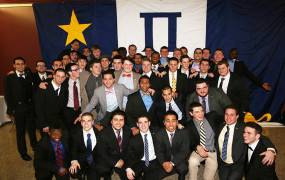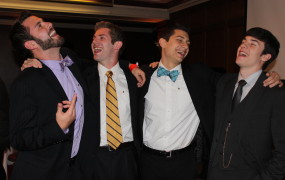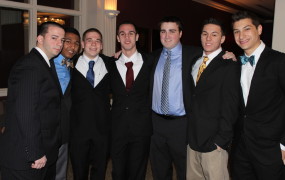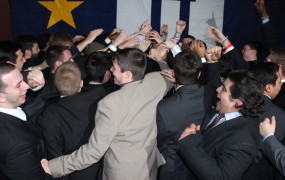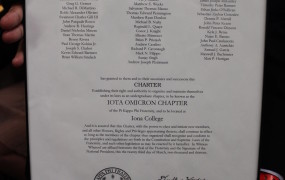History
In 1976 Durward Owen, then Executive Director of Pi Kappa Phi, called a meeting of the minds with the leaders of Pi Kappa Phi in an effort to mobilize the work force that was the fraternity???s undergraduate members.
At that time, he approached a man named Thomas Sayre who designed a therapeutic play unit for children with severe disabilities. Little did they know that their collaboration would spur a philanthropic initiative that is, to this day, an unparalleled success in the Greek world.
Push America, a 501(c)(3) nonprofit organization, was founded in 1977 and remains the exclusive philanthropy of Pi Kappa Phi with the purpose of instilling lifelong service in our fraternity members and serving people with disabilities.
Ingenuity has allowed for Push America to develop premier programming for Pi Kappa Phi undergraduates and alumni. What started out as construction of Thomas Sayre???s play unit has evolved into nationally recognized programs that work collectively to promote a greater understanding of people with disabilities.
In 1987, a young Pi Kappa Phi alumnus named Bruce Rogers embarked on a daunting journey of cycling across the country in an effort to bring more attention to the mission of Push America. Inspired by his inaugural trip, a 21-person team, organized by Jim Karlovec, then a student at Bowling Green State University, rode the first official Journey of Hope in 1988. Now every summer, members of Pi Kappa Phi cycle from San Francisco and Seattle to Washington, D.C. while delivering a message of understanding. A two week cycling trip, fashioned in the likeness of Journey of Hope, called Gear Up Florida began in 1997 and today is touted as the best two weeks of programming that Push America has to offer.
Push America???s construction effort expanded in 1989 when the first Give-A-Push Weekend was held at Holy Angels in Charlotte, N.C. Now undergraduates from all over the country have the opportunity to attend one of these two-day programs, where they work together to construct accessible amenities for facilities serving people with disabilities. Two years later, the first week-long construction program entitled Push Camp, was held at the Clemson Outdoor Lab in Clemson, S.C. Today, Pi Kappa Phi members forgo the traditional college spring break experience to attend this week of service, brotherhood and fun. The third construction program, AccessABILITY, was introduced in 1994 and is designed to allow undergraduates and alumni to participate in local service projects that make homes accessible through the construction of wheelchair ramps. In 2003, the inaugural Build America took members to six camps in six weeks to build accessible amenities and interact with campers for a summer of service.
Undergraduate chapters across the country have and continue to establish volunteer relationships with local facilities that serve people with disabilities in conjunction with fundraising on campus and in their local communities for the programs of Push America. Members of Pi Kappa Phi have raised millions of dollars for the programs of Push America as well as donated millions of man hours to renovate facilities that serve people with disabilities across the country. The history of Push America is not complete. New programs are on the horizon, there are more funds to be raised and millions of Americans to expose to the mission of Push America and how members of Pi Kappa Phi are bringing that mission to life every day.
Facts
- To date, Push America has raised over $15 million to benefit people with disabilities and organizations dedicated to their service.
- Since 1988, over 1,500 men have participated in Journey of Hope, Gear Up Florida and Build America. Each year, those events combined raise over $600,000.
- Since 1989, two of Push America???s construction programs, Give-A-Push Weekends and Push Camps, have provided over 600,000 volunteer hours to help renovate over 100 facilities that serve people with disabilities.
- Every year, outside of the organization???s events, Push America trains over 200 leaders of Pi Kappa Phi on disability awareness issues and how they can spread the message of acceptance and understanding in their local communities. These leaders help to relay their training to the other 7,000 active undergraduates of Pi Kappa Phi.

